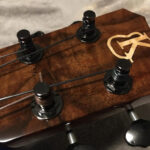John Baizley of Baroness once mentioned a First Act signature model, sparking curiosity among guitar enthusiasts. While readily available information about signature models or even current First Act Guitars is scarce, especially beyond basic “guitar packs”, there’s a deeper story behind the brand, particularly its high-end instruments. Despite a somewhat confusing market presence, vintage First Act Custom Shop guitars still command attention and value on platforms like eBay.
The truth is, First Act’s Custom Shop is a relic of the past, having ceased operations years ago. Their flagship store in Boston is also long gone, a location that ironically became a bar before being tragically impacted by the Boston bombing. This history underscores a key aspect of First Act’s legacy: a disconnect between its budget-friendly image and the high-caliber instruments it once produced.
During their peak, First Act guitars found favor with a surprising number of prominent bands across the metal and hardcore scenes. Bands like Underoath, Norma Jean, The Chariot, The Almost, Bring Me the Horizon, Converge, Every Time I Die, Architects, Mastodon, and High On Fire, among others, were all seen wielding First Act guitars. This impressive roster of artists served as a testament to the quality that First Act was capable of achieving, particularly within their Custom Shop. These weren’t entry-level instruments; First Act Custom Shop guitars often carried price tags of $2,500 and upwards, reflecting their build quality and bespoke nature.
However, the very name “First Act” became a double-edged sword. The company’s attempt to bridge the gap between their mass-market toy guitars and the Custom Shop line through branding ultimately backfired. Instead of elevating the perception of their cheaper instruments, the association dragged down the reputation of the high-end guitars. Consumers struggled to reconcile the “First Act” name, synonymous with beginner guitars, with the idea of professional-grade, expensive instruments. This branding misstep, coupled with a lack of mid-range offerings to cater to intermediate players, contributed significantly to the brand’s decline in the custom guitar market. First Act essentially operated in extremes – either very affordable starter packs or high-end custom creations, missing the crucial middle ground that could have sustained broader appeal.
In conclusion, the story of First Act guitars is a cautionary tale of branding and market perception. While their Custom Shop produced instruments worthy of renowned musicians and significant price tags, the company ultimately couldn’t overcome the ingrained association with their entry-level products. The name “First Act,” intended to suggest a starting point, inadvertently became the brand’s ultimate limitation in the eyes of many serious guitar players.

